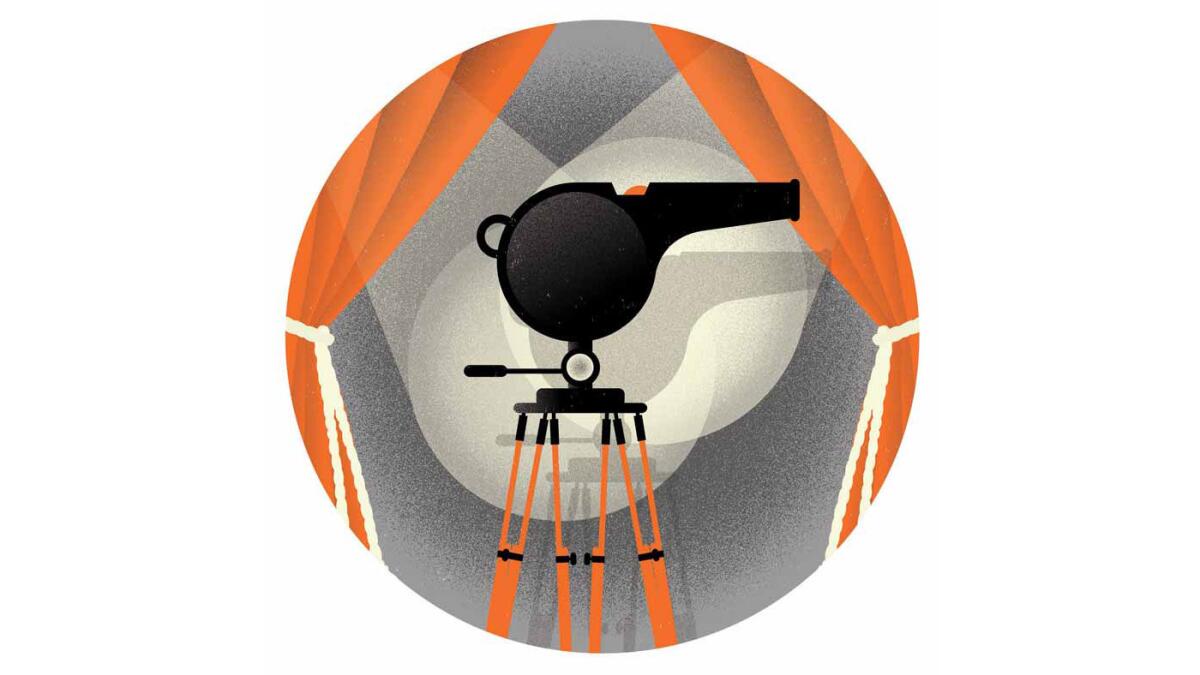‘Big Short,’ ‘Spotlight’ and ‘Concussion’ put scandalous behavior and whistle-blowers in focus

This year, “Spotlight,” “The Big Short” and other films about scandals are currying awards attention.
- Share via
Oscar voters love great movies about awful behavior and the intrepid souls who expose it. “Serpico,” “All the President’s Men,” “Silkwood,” “The Insider” and “Erin Brockovich” ripped into corrupt systems, stirred moral outrage and collectively snagged 27 Academy Award nominations along the way. This fall, three fact-based movies extend the tradition by revisiting scandals that have tarnished mighty institutions: Wall Street, the Catholic Church and the National Football League.
“The Big Short,” based on Michael Lewis’ nonfiction account, exposes how toxic housing assets contaminated financial markets during the run-up to 2008’s economic crash. Unlike archetypal whistle-blowers, the “Big Short” protagonists, including the nerdy stock analysts portrayed by Christian Bale and Steve Carell, simply want to make money.
SIGN UP for the free Indie Focus movies newsletter >>
Writer-director Adam McKay says that “one of the things I really liked about Michael Lewis’ book is that these guys are not virtuous white-hat-wearing heroes, by any means. Initially, they’re just doing their jobs. The part that makes you ache about this story is that in the end, they did try and warn people that the entire system had been bought, but no one wanted to hear it.”
Realizing that audience members need to understand the scams before they could be offended by them, McKay recruited a group of “celebrity explainers” to define Wall Street’s deliberately esoteric terminology through simple metaphors. Selena Gomez, for example, demonstrates the concept of “collateral debt obligations” from the floor of a gambling casino. “So much of what led us to miss this collapse is that we live in a 24-hour pop culture news cycle,” McKay says. “I thought it would be funny and useful to have someone like Selena Gomez give specific descriptions of how these financial instruments work.”
Unlike the morally conflicted money men in “The Big Short,” heroes are clearly delineated in “Spotlight,” which features Mark Ruffalo, Michael Keaton and Rachel McAdams as the relentless Boston Globe reporters responsible for a 2002 exposé of accusations of sex abuse against local Catholic priests. Josh Singer, who co-wrote the movie with director Tom McCarthy, centered the narrative on the investigation rather than depicting the crimes themselves. “By focusing on the reporters, Tom and I were able to keep some of the abuse stuff at a distance to some degree,” Singer says.
Taking a cue from the journalists portrayed in their movie, McCarthy and Singer conducted dozens of interviews in order to flesh out the reporters’ personal journeys in the face of enormous institutional pressure. The filmmakers also talked to victims. “The first time I sat down with priest-abuse survivor Phil Saviano, it was incredibly upsetting,” Singer says.
The Globe’s Pulitzer Prize-winning series helped inspire more than 150 similar investigations into Catholic dioceses domestically and abroad. Singer hopes “Spotlight” has a similar impact. “What I learned about priest abuse in writing this movie made me very angry at the institution of the Church,” he says. “I don’t think they’ve done nearly enough to protect kids. They’re still not transparent about the abuse that happened and continues to happen. I love what Pope Francis is trying to do with climate change and everything else, but he needs to get his own house in order.”
“Concussion” (opening Dec. 25) follows Nigerian-born forensic neuropathologist Bennet Omalu, portrayed by Will Smith, as he tries to sound the alarm about brain disease suffered by many football players competing in America’s roughest contact sport. Writer-director Peter Landesman, a former New York Times investigative reporter, found the doctor’s David and Goliath story irresistible. “Bennet Omalu was driven by the purity of his mission: to tell the truth about a plague seeping through the most powerful and wealthy spectacle in America, NFL football,” Landesman says.
Building on the 2008 GQ magazine article “Game Brain,” Landesman spent two months researching the science behind chronic traumatic encephalopathy. “I immersed myself in the subject and interviewed everyone I could get my hands on, beginning with Bennet,” Landesman says. “It’s easy to get lost in a jungle of information, but I never lost sight of the fact that this movie is about one man’s journey and that the stakes were intensely personal.”
Taking on a powerful sports industry, Omalu had a tough time getting his voice heard when he first uncovered the ruinous effects of game-induced traumatic head injury. “Concussion” represents a fresh opportunity to put the doctor’s findings in front of the public.
“[Bennet’s] work has had limited exposure,” Landesman says. “This movie is the first time the power and scope of his discovery will be synthesized for an audience in one place. I hope it gives commentators, football fans and perhaps even the NFL itself permission to finally be open about what is really happening. And I hope we follow in that great tradition of whistle-blower thrillers, because there’s something about those movies that inspires the righteous indignation we all need to muster if we are going to change a wrong into a right.”
More to Read
From the Oscars to the Emmys.
Get the Envelope newsletter for exclusive awards season coverage, behind-the-scenes stories from the Envelope podcast and columnist Glenn Whipp’s must-read analysis.
You may occasionally receive promotional content from the Los Angeles Times.






